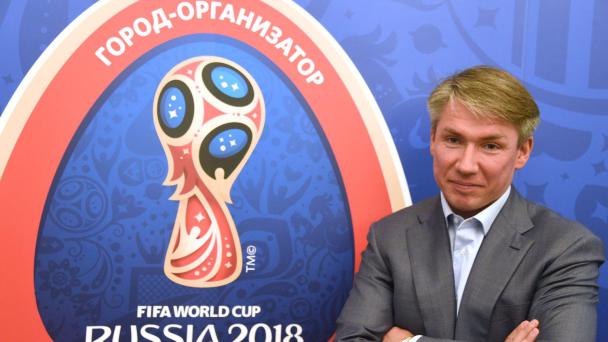July 3 – The Confederations Cup has been a test of Russia’s organisational skills and a credible warm-up for 2018. Alexey Sorokin, chief executive of the Organising Committee for the 2018 World Cup in Russia, in an exclusive interview with Samindra Kunti talks about the learnings from the tournament, Russia’s expectations for 2018, and his bid for a seat on FIFA’s Council.
From an organisational point of view, how do you reflect on the tournament?
It has been well organised. We are happy with how our plans were implemented and how the organisational structured worked. Over the past two weeks we saw a lot of positive reactions on social media from fans, officials and players. We are happy that most people said that they would like to return to Russia.
What are the ‘wins’ from this tournament that you’d like to take forward to next year’s World Cup?
We will use all the positives initiatives that were launched for this Confederations Cup at the World Cup next year: fan id, which is not only a security measure but also a tool for services, free transportation, free Wi-Fi, multiple services for disabled people, the bracelet for kids, my personal favourite with about 2,000 kids using it. The transport is not only the train, but also free shuttles to get from the city centre to the stadium, and free tickets to public transport in the cities. In general, all these initiatives worked well.
What have you learned from this tournament that will need to be improved?
There are many matters of a technical nature. We need to inform fans to come on time. There were some occasions when people came in a little late. A stadium is not a theatre where you find your seat a few seconds after you have entered the building. We will increase fan id centres at the stadiums to provide more comfort to spectators who didn’t receive a fan id beforehand. There will be some changes to the free trains as we now know which trains were popular and less popular. We will introduce some minor improvements in that respect, but in general it worked well.
Has Russia in staging the Confederations Cup understood that the magnitude of the World Cup outstrips the scale of the Winter Olympic Games?
It’s difficult to compare the two events as they are very different. In football there is a big geography, a lot of people that participate. We issued more than 60,000 accreditations to prepare [for this Confederations Cup]. We expect more than three million spectators at the World Cup. The volumes are huge. Football has its own traditions and organisational practices. We will just try to make all the visitors happy, our job is to keep all the constituent groups happy.
Have you been satisfied with the interest of the local fans in the Confederations Cup?
Yes, the attendance level was good, even when the Russian team didn’t play. The level of interest in the Russian team was huge. We have been very happy with the support that foreign teams received from the Russian fans. In the game Cameroon vs Australia the whole stadium in Saint Petersburg chanted ‘Cameroon, Cameroon’. It was also a big response to any allegation of racism in Russia. There were some touching moments during the tournament.
Russia may need to play better next year to galvanise the World Cup.
It’s true that we didn’t qualify for the knockout phase, but we have a team. They fought. They weren’t intimated by Mexico or Portugal, great teams with different styles. In general Russian supporters liked the strength and the feeling of the team. We can’t say that they had no belief or that they were lazy. They got the best out of themselves. There is one way year to go to bring the team together. We expect Russia to be really strong next year.
With all the allegations of doping, corruption, racism and hooliganism has this tournament changed the perception about Russia, if at all?
It dispelled many stereotypes and many fears of people who were initially hesitant about coming here. We understand that most people enjoyed themselves, had a great time in Russia and would like to come back. Look at what the players are saying about their stay, it’s all very positive. You can say whatever you want about Russia, but the best way to showcase the country is by actual work and organisation.
Earlier this week FIFA published the Garcia report, a good decision from FIFA?
It’s FIFA’s decision, but for us it is good that an independent report, and not only us, is saying that we are clean. It has basically proved everything that we have been saying for the last five years. Honestly, in all these years, we didn’t think a lot about the matter in general, because it was never a threat to us. We knew the truth, we knew that the truth would prevail. It’s simply now that the conclusions have been made public. We hope that we don’t have to answer the same questions over and over again.
Are you still bidding for the one remaining seat on the FIFA Council?
Yes, the Russian federation has sent its application to UEFA. This candidature is undergoing the appropriate procedure with FIFA and eligibility checks, etc. but the vote is in September. It is hard to say anything. The Russian Football Union sent an application with my name. That is a fact, now my resume is being studied.
Are you confident the vote will go your way?
It’s not about confidence, it’s the choice of UEFA members. I hope that they trust me.
Contact the writer of this story at moc.l1751312464labto1751312464ofdlr1751312464owedi1751312464sni@n1751312464osloh1751312464cin.l1751312464uap1751312464

